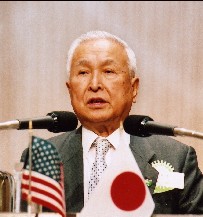Living in Good Health and Dying with Dignity
August 3rd,2005
Chancellor of the Nagoya College of Art, and Chairman of the Japan Society for Dying with Dignity
Mr. Akihiro Igata
 Japan now has the longest natural life span in the world, and the world��s attention is centered upon us to see how we have created a system for this, how we lead our lives and how we face our deaths.
Japan now has the longest natural life span in the world, and the world��s attention is centered upon us to see how we have created a system for this, how we lead our lives and how we face our deaths.
To celebrate the 60th Anniversary of our late Emperor��s accession to the throne, plans were made to open a Long Life Medical Center in Nagoya.
Last March, a Cancer Center, and a Blood Circulation Center which is the equivalent of a Long Life Center was opened. The theme for this Center is how to attain long life and to maintain it. The reason a Long Life Center instead of an old age center is because we felt that unless the aged live happily, such efforts would be meaningless.
Although a dark picture is painted of the aged, those over 65 who need assistance are only 16% of the total. As 84% of them are well and able to participate in social activities they should be the center of attention.
We age every year, but the degree differs from person to person. We should think about our true age as being how well we are. No matter how much medical attention improve, we are fated to die. Yet due to medical progress, many are able to extend their lives. The use of artificial respirators and hearts is now become common. Artificial hearts came into use about the time I graduated Medical School, and with the use of artificial respirators, a person can live 10 or 20 years after the lungs have stopped working.
Therefore, it is natural a person would think he would like to decide by himself when to terminate his life. When his illness was determined to be incurable, he would not wish to extend his life by applying artificial measures which cause further suffering.
In 1990, our Welfare Ministry formed a Provisional Committee on Brain Deaths which discussed the matter of removing a person��s internal organs after brain death was pronounced. I was a member, and fruitful discussions took place.
Cancer cases have been increasing. When all treatments fail and the patient suffer from great pain, steps must be taken to alleviate the patient��s suffering and hospices have been created to improve the quality of life in the last days.
As aged persons increase, no one can tell with any certainty when he will become bedridden. Many people question being fed through pipes or being left alive by use of an artificial respirator.
In Europe, it has almost become a matter of common sense, that when the patient makes it clear, life extending practices will not be used.
In Japan, a patient can leave a living will telling his doctor not to resort to the use of life extending instruments. The Japanese Society for Dying with Dignity was formed in 1976, and we have made presentations to our Diet members to make this legal. Today, we have 74 Diet members who approve of this.
Dying with dignity has entered the vocabulary after the World Doctor��s Association used this term in 1981, but it is not the same as Euthanasia.
Euthanasia is becoming a major problem. In 1962, in Nagoya there was a case in which the children of an ailing father could not bear the sight of his suffering and fed him with poisoned milk. The court ruled against this, stating that it did not conform to the 6 rules of ��own will, incurable condition, insufferable pain, medical limitations, conscientious method, and practiced by a medical doctor.��
This was the first time the term Euthanasia was used in a law court.
In the Tokai University the doctor, by strong requests from the patients relatives gave a fatal solution. But the court also rejected the plea stating that the patient��s wishes had not been taken into account. Overseas, it is the patient��s wishes that are overriding, and in Japan is seems to be taken lightly.
Last year, the 15th World Conference of the World Federation of Right to Die Societies took place in Tokyo. Long life is fortunate, but we must all die, we all have the right to determine when and how to die. It is unnatural that we are unable to exercise our will during our last hours. To defend our right to live in peace should be a key word in our long life society.